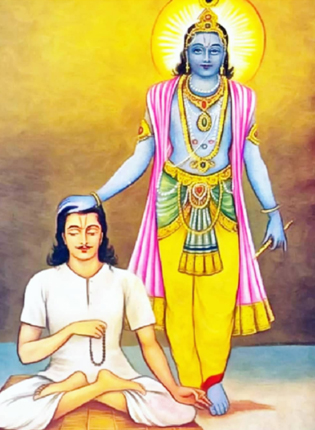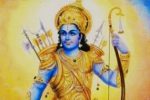NAME 77
Medhāvī मेधावी
Medhā means intelligence personified. Brahman alone is Medhāvī because all the Vedas originate from Him. Vedas are said to be His breath. The best of human knowledge is only a miniscule of His knowledge.
Muṇḍaka Upaniṣad (I.i.9) explains this, “The Brahman is all-knowing, who knows everything in detail. From His knowledge came names, forms and food.”
Kṛṣṇa says in Bhagavad Gita (XVIII.10), “The one who does not hate bad actions or likes good actions is truly wise, with all his doubts cleared and is said to be a man of true renunciation.”
Medhavi – One with great intelligence
Medhavi is a person who combines great memory with great intelligence.
Sri Adi Sankara says ‘Medhaa bahugrantha dhaarana saamarthyam, sa yasya asti sa medhavi – Medha is the ability to grasp several ideas on different subjects at the same time; One who has this ability is naturally a Medhavi’.
When a Bramhachari performs Samitha Dhanam (twig offering to Fire or Yagna), the first blessing he prays to receive from Agni Bhagavan is ‘Medhavi Bhooyaasam – Let me be endowed with good memory and intelligence’. There are of course other things like ‘Tejasvee, Varchasvee, Bramhavarchasvee, Aayushmaan and Annadah’ but for a student, being a ‘Medhavi’ comes first in the list of priorities!
The Supremely intelligent; One who is capable of understanding everything. Bhagavan is Isvara, Vikrami, Dhanvi, etc., because He is a Medhavi, one who can command the knowledge of anything at any time as desired. One who has the capacity to comprehend intellectually all that is happening around is called Medhavi. Since Consciousness is the One Light in all living creatures, which illumines all intellects, and since Vishnu is this Infinite Consciousness, He is the One Knower, knowing all things, at all times, at once. Hence Saraswati, the Goddess of Learning and Knowledge is described as the very tongue of Vishnu.
७७. ॐ मेधाविने नमः |
77. OM Medhāvine Namaḥ
Medhaavee -Supremely intelligent; One who is capable of understanding everything. One who has the capacity to comprehend intellectually all that is happening around is called Medhaavee. Since Consciousness is the One Light in all living creatures, which illumines all intellects, and since Vishnu is this Infinite Consciousness, He is the One Knower, knowing all things, at all times, at once. Hence Sarasvati, the Goddess of Learning and Knowledge is described as the very tongue of Vishnu.Medhā – bahugraṃtha dhāraṇa sāmarthyaṃ asya asti / मेधा – बहुग्रंथ धारण सामर्थ्यं अस्य अस्ति He who has Medhā, the capacity to understand many treatises.
INTERPRETATION GUIDED BY SANT VANI (WORDS OF SAINTS)
Medhāvī
The one with the power of retention and recollection.
He who is endowed with innate Omniscience that he possesses naturally, is boundless and unlimited and a reflection of his exalted state (Parāsara Battar). He who is Supremely intelligent and capable of understanding and comprehending everything that is happening (Śaṅkara).
Medhāvī is one who has medhā. Medhā is more than memory; It is not like the amount of memory space on the hard disk of a laptop. Medhā is the capacity to analyze and grasp, retain and recollect not just a few things but many texts, many disciplines of knowledge.
The capacity to analyse and grasp go hand in hand. We know that the more one has looked at a situation from many perspectives, the learning/s from the situation is easy to grasp. To be able to
retain the learning, requires a mind that can handle distractions, that does not run away with the first distracting thought. If one is able to retain the learning, it is easier to recollect too.
We are going through the names of Viṣhṇu sahasranāma, word by word. Each word is complete to reveal the Lord in and of itself and at the same time it is also connected to the other words. If we look at the last few words – they were Vikrami (the valiant), Dhanvī (the wielder of the bow) and Īśvara (the omnipotent). To be able to recognise the glory of the Lord, when I connect the dots, in this case the words, they reveal to me a certain understanding. I can connect the dots in a better way, if I am able to retain the words and their meaning. If I am not able to retain it, I have to look back at the previous posts. Because of retention of many of the words and meanings, there is a certain depth in my understanding, making it easier for me to seek refuge in the Lord.
Where things or situations are to be changed, I seek the courage to change, where things or situations cannot be changed, I seek to accept and the wisdom to know the difference. When I see what is, I stop resisting facts. And that makes a huge
difference to my life! And this is only here, medhā refers to the capacity for retention of the wisdom many disciplines of knowledge.
If anyone has this capacity of medhā, that is also the glory of Parameśvara. In the Gītā, Bhagavān says, ‘I am the intelligence of the intelligent’ (7.10).
As Śaṅkara says “medhA bahugrantha dhAraNa sAmarthyam, sa yasya asti sa medhAvI – He is a Medhāvī who has (or has developed) a natural ability to grasp several ideas, on different subjects at the same time.
An illuminated consciousness at an individual level is the key to obtain Viveka (discernment). As Viṣhṇu is the epitome of Infinite Consciousness, he who estabishes Viṣhṇu in his heart naturaly develops Viveka i.e. discernment. Further, Sarasvatī (सरस्वती), the Goddess of Learning and Knowledge resides on Vishnu’s tongue.
Vishnu is seen everywhere, in tanks, in wells, in running streams. Because he resides in Saras, therefore he is called Sarasvan. Vani is the Shakti of that Sarasvan; therefore she is denominated Sarasvati. The river Sarasvati was a very sacred Tirtha. She was the burning fire to the fuel of sins, of sinners. Bathing in the river was also helpful in reaching Vaikuthlok (But now it has dried up.)
Medha Suktam eulogizes Devi Saraswati on Viṣhṇu’s tongue invoking her in our intellect and heart to reveal the inner wisdom:
In the Bhagavad Gita, Bhagawan illustrates who is the person who is fit to be called a Medhāvī
न द्वेष्ट्यकुशलं कर्म कुशले नानुषज्जते |
त्यागी सत्त्वसमाविष्टो मेधावी छिन्नसंशय: || 18-10||
na dveṣhṭy akuśhalaṁ karma kuśhale nānuṣhajjate
tyāgī sattva-samāviṣhṭo medhāvī chhinna-sanśhayaḥ
Unperturbed by work that is sometimes not pleasant, equanimous when performing work that is pleasing, that person who works for the sake of work alone (doing it to the best of his/her ability) and is not constantly focused on ‘fixing’ the outcomes, and his outlook is balanced and imbued with Sattva-guna, that person is a Medhāvī.
There is one person who fits the above description perfectly – Maryādā-Puruṣottama-Rāma
In Śaṅkara’s Vivekachudamani, a reference to a Medhāvī–Puruṣa is made
मेधावी पुरुषो विद्वानुहापोहविचक्षणः ।
अधिकार्यात्मविद्यायामुक्तलक्षणलक्षितः ॥ १६ ॥
medhāvī puruṣo vidvānuhāpohavicakṣaṇaḥ |
adhikāryātmavidyāyāmuktalakṣaṇalakṣitaḥ || 16 ||
He is a Medhāvī who not only grasps the meaning of the scriptures but is also skilled in speaking in favor of the scriptures and also refuting counter-arguments/misinterpretation(made against them) as Shashtrarth – Such a person alone is considered qualified to start the inquiry into the nature of the “Self” within – the Brahman/Ātman.
If one really wants to understand who a Medhāvī–Puruṣa really is, then one needs to read Sage Nārada answering Adhi-Kavi Valmiki’s question as to who is that person who can be considered THE Puruṣottama – the one embodiment of all virtues:
—Quote:
“Rama, born into the family of the Ikshvaku. He is fair of face and just of nature. He is broad shouldered and strong with a tapering waist and hips like the lion, yet he is gentle of speech and manner. His charm is captivating, yet he strikes terror in the bosom of his foes. He is an expert archer and wields a huge bow. His gait is regal and graceful. He has a noble brow, large limpid eyes and a neck that is as beautifully contoured as a conch. He is learned and wise, versed in the scriptures, sciences and all arts and crafts, yet not boastful or vain. He is the defender and embodiment of dharma endowed with all the virtues worth extolling. Yet he is not impatient with or scornful of those less endowed than he is. He is a prince amongst men and kings, yet a servant and beloved of his subjects. He is as mighty and valorous as Visnu, truthful as dharma, generous as Kubera, and steadfast as the Himalayas and his countenance is as serene as the moon. None can equal him in observance of filial duty or respect for elders. Love emanates and radiates from his person and his profundity is comparable to the ocean. His patience is as immense as that of mother earth, yet his wrath, if incurred, is cataclysmic. Indeed, there is none to rival him. He is Rama, the paragon of all virtues, the delight and pride of Kausalya, his mother.”
—Unquote
It’s not enough to know the meanings of any scripture intellectually. Unless you have adopted the teachings and meditated on them, done vichaar, chintan Mannan and acharan of those teachings it but remains a dead piece of borrowed information. True medha gushes forth in your being by acting upon those teachings and discovering their deeper essence in your own meditative state.
As Swami ji says and I quote:
Esoteric meaning of the scriptures
“Over time, I will continue to uncover meanings of major purāṇic and other legends as they are revealed to me. I shall also shed light on the major epics to the best of my abilities. But please note that such epics were documented by seers who were not just ordinary humans but had become divine with the power of their penance. They were embodiment of knowledge and light. The duration and quality of their tapas gave them the ability to see things unconventionally. The extraordinary stillness of the mind they had attained through their searing penance also bestowed them with razor sharp intelligence.”
With my tiny intellect, a billion times smaller than a mustard seed, it will be quite audacious if not downright arrogant on my part to claim deciphering their esoteric meaning. I do not want this to be an intellectual exercise. Admittedly though, during my samādhi all sorts of revelations do fountain forth. But such revelations when worded may or may not make sense to all and sundry. In fact, they may even hurt the religious sentiments of some.
It is a challenge to word all that I find. For one language is a limiting element and two, the subject is beyond deliberation. Having said that, I will let my babbling drool. If it can inspire any person, anyhow, anytime, or help even one seeker realize his truth, my job is done.
A new meaning upon each reading
This is exactly what makes them timeless. Depending on the bhāva of the reader, the depth of his knowledge, and his concentration, a different meaning will emerge each time one reads such literature. That is the hallmark of an original and unconventional piece of work. Any literature that is merely the outcome of dry intelligence or crafty writing skills will lose its luster after a while.
Profound works that are products of penetrating analysis or deep devotional sentiments do not ever lose their originality. It is this very feature that separates the ancient scriptures of sanātana dharma, commonly known as the Hindu religion, from many of the modern texts in the same religion.
– Unquote
PLEASE READ
https://os.me/scriptures-their-meaning-validity-and-reading/



